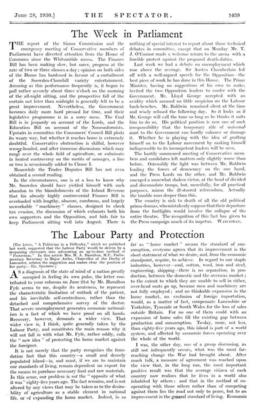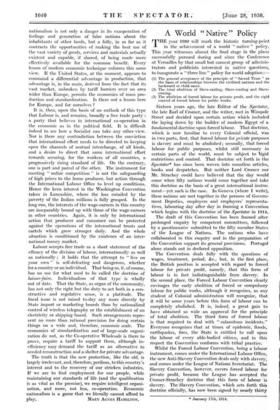The Labour Party and Protection
[The letter, "A Politician in a Difficulty," which we published last week, suggested that the Labour Party would be driven by a despairing electorate into advocating an up-to-date method of "Protection." In this article Mrs. M. A. Hamilton, M.P., Parlia- mentary Secretary to Major Attlee, Chancellor of the Duchy of Lancaster, refutes the suggestion and makes clear the position of her party.—En. Spectator.] AS a diagnosis of the state of mind of a nation greatly occupied in feeling its own pulse, the letter con- tributed to your columns on June 21st by Mr. Hamilton Fyfe seems to me, despite its acuteness, to represent the characteristic limitation of outlook of the patient, and his inevitable self-centredness, rather than the detached and comprehensive survey of the doctor. That severe unemployment generates economic national- ism is a fact of which we have proof on all hands. Recovery, however, demands a wider view. That wider view is, I think, quite generally taken by the Labour Party, and constitutes the main reason why it will not fall in with what Mr. Fyfe, rather oddly, calls the "new idea" of protecting the home market against the foreigner.
It is not merely that the party recognizes the foun- dation fact that this country—a small and densely populated island—is, and must, if we are to maintain our standards of living, remain dependent on export for the means to purchase necessary food and raw materials. In this sense, our problem is not the "opposite of what it was" eighty-five years ago. The fact remains, and is not altered by any views that may be taken as to the desira- bility of agriculture as a stable element in national life, or of expanding the home market. Indeed, in so far as " home market" means the standard of con- sumption, everyone agrees that its improvement is the short statement of what we desire, and, from the economic standpoint, require, to achieve. In regard to our staple industries, however—coal, cotton, wool, iron and steel, engineering, shipping—there is no separation, in pro- duction, between the domestic and the overseas market ; to the extent to which they are unable to sell in either, over-head costs go up, because men and machinery are not fully employed ; and no thinkable expansion in the home market, no exclusion of foreign importation, would, as a matter of fact, compensate Lancashire or Yorkshire, Tyneside or South Wales for the loss of sales outside Britain. For no one of them could with an expansion of home sales fill the existing gap between production and consumption. To-day, more, not less, than eighty-five years ago, this island is part of a world system, and affected by economic forces operating over the whole of the world.
I was, the other day, one of a group discussing, as still not infrequently occurs, what was the most far- reaching change the War had brought about. After much talk, a measure of agreement was reached upon the view that, in the long run, the most important positive result was that the average citizen of each country now realizes that he lives in a world also inhabited by others : and that in the method of co- operating with those others rather than of competing against them lies the road not only to peace, but to an improvement in the general standard of living. Economic nationalism is not only a danger in its exasperation of feelings and generation of false notions about the inhabitants of other lands, but a folly, in so far as it contracts the opportunities of making the best use of the vast variety of goods, services and materials actually existent and capable, if shared, of being made more effectively available for the common benefit. Every lesson of modern economic technique enforces this same view. If the United States, at the moment, appears to command a differential advantage in production, that advantage is, in the main, derived from the fact that its vast market, unbroken by tariff barriers over an area wider than Europe, permits the economies of mass pro- duction and standardization. Is there not a lesson here for Europe, and for ourselves ?
It is, then, upon the basis of an outlook of this type that Labour is, and remains, broadly a free trade party : a party that believes in international co-operation in the economic as in the political field. It is difficult indeed to see how a Socialist can take any other view. Nor is there any contradiction between the conviction that international effort needs to be directed to keeping open the channels of mutual interchange, of all kinds, and a desire to direct that same international effort towards securing, for the workers of all countries, a, progressively rising standard of life. On the contrary, one is part and parcel of the other. The instrument for meeting "unfair competition" is not the safeguarding of high prices to the home producer, but action through the International Labour Office to level up conditions. Hence the keen interest in the Washington Convention taken in Lancashire, where the loss entailed by the poverty, of the Indian millions is fully grasped. In the long run, the interests of the wage-earners in this country are inseparably bound up with those of the wage-earners in other countries. Again, it is only by international action that producer and consumer can be protected against the operations of the international trusts and cartels which grow stronger daily. .And the whole situation is conditioned by the existence of an inter- national money market.
Labour accepts free trade as a short statement of the efficacy of the division of labour, internationally as well as nationally ; it holds that the attempt to "live on your own " is self-defeating and dangerous, whether for a country or an individual. That being so, it, of course, has no use for what used to be called the doctrine of laisser-faire. Individualism of that type is wholly out of date. That the State, as organ of the community, has not only the right but the duty to act both in a con- structive and regulative sense, is a platitude. The fiscal issue is not raised to-day any more directly by State import or marketing boards than by nationalized control of wireless telegraphy or the establishment of an electricity or shipping board. Such arrangements repre- sent no more than rational provision for doing certain things on a wide and, therefore, economic scale. The economies of standardization and of large-scale organi- zation do not, as the Co-operative Wholesale is there to prove, require a tariff to support them, although in-.
efficiency may demand the tariff as an alternative to needed reconstruction and a shelter for private advantage. The truth is that the new protection, like the old, is largely irrelevant, and, therefore, perilous, to this country's interest and to the recovery of our stricken industries.
If we are to find employment for our people, while maintaining our standards of life (and the qualification is as vital as the premise), we require intelligent organi- zation, and more, not less, co-operation. Economic nationalism is a game that we literally cannot afford to



















































 Previous page
Previous page